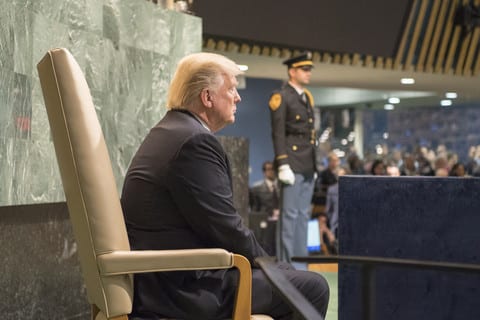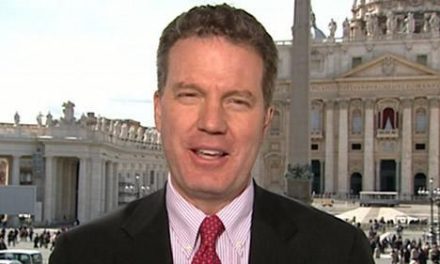Trump’s two year Mideast policy scorecard is a mixed picture: Partial success stories and incomplete policies. But if Republicans maintain full Congressional control, an unleashed president could have an explosive effect on the region
By Daniel B. Shapiro, Haaretz
Middle East policy is unlikely to determine the outcome of next week’s mid-term elections in the United States. Voters will more likely be motivated by their sense of their economic well-being and prospects, the social and political tensions dividing America, and whether they want a more unleashed or a more constrained President Donald Trump.
But it bears evaluating how Trump’s Middle East record stacks up at the halfway point of his term, and considering the paths it is likely to take depending on the election results.
On a range of issues, Trump has achieved at least a partial success.
In Syria, U.S. and allied forces have nearly completed the campaign to destroy ISIS, and U.S. strikes on Assad following chemical attacks seem to have deterred the dictator from resorting to the use of those weapons (although not other atrocities against regime opponents).
Trump’s Iran gambit, withdrawing from the nuclear deal and imposing harsh unilateral sanctions, is generating far more pressure on the Iranian economy and regime than many observers predicted could be achieved by this point. Even tougher blows are still to come when full oil sanctions are restored in November.
In Israel, Trump enjoys widespread popularity, a product of his unstinting support, his warm relationship with Prime Minister Benjamin Netanyahu, the Iran decision, and his historic relocation of the U.S. Embassy to Jerusalem.
Regionally, the United States maintains partnerships with a coalition of Israel and Arab allies, including Saudi Arabia, the UAE, Egypt, and Jordan, and has pushed hard for openings toward normalization between Israel and Arab states. Netanyahu’s visit to Oman and the Israeli athletic teams competing in the UAE are recent dividends on that strategy.
Each of these areas of progress, however, are incomplete, and many run parallel to ongoing challenges. Some initiatives drift with low prospects of resolution. Trump’s ability to consolidate the gains and advance further toward his goals, will be tested in 2019.
In Syria, the Assad regime has been stabilized through brutal crushing of the opposition, and Russia has emerged as the dominant player.
Israel is working hard, with U.S. support, to protect its interests by acting kinetically to disrupt Iran’s ongoing efforts to entrench threatening military assets in Syria. But Russia’s willingness to accommodate Israeli action is being tested following the downing of a Russian military aircraft by Syrian air defense units.
Overall, the United States is largely absent from efforts to shape the post-war Syrian reality now emerging, raising questions about its ability to ensure that U.S. and Israeli interests are protected.
The Iran strategy, so far, involves the United States acting alone. While acquiescent to some secondary sanctions, no European country has followed the United States out of the nuclear deal. And the desired endgame is far from clear.
After sanctions impose a further bite on Iran, then what? Will the United States entertain negotiations with Iran on a new nuclear agreement, and if so, what kind of agreement would be considered success? What are the chances one could be reached?
And if Iran pulls out of the agreement and resumes uranium enrichment to the threshold of nuclear breakout it was at before the JCPOA, would the United States pursue a military option or give Israel a green light to do so?
If Trump has answers to these questions, they remain opaque.
The Israeli-Palestinian peace effort, meanwhile, seems hopelessly stuck. That is not Trump’s fault, given the deep and abiding mistrust between the two sides, but the extreme Palestinian reaction to the Jerusalem announcement, and subsequent blows by the administration against the Palestinians, cutting off nearly all U.S. non-security assistance, has left the United States unable to conduct even a rudimentary dialogue with a Palestinian partner.
With no channel to one of the parties, no prospects for a deal or even negotiations between the current leaders, and Israeli elections around the corner, Trump may simply decide never to present his plan for the ultimate deal.
And while the regional partnerships have borne fruit, they are also susceptible to the whims of unreliable players.
The murder of Saudi journalist Jamal Khashoggi, on the heels of Saudi missteps with Qatar, Lebanon, and Canada, and a grinding war with devastating civilian suffering in Yemen, raise questions about the reliability and effectiveness of Saudi Crown Prince Mohammed bin Salman, who is supposed to be the strategic anchor of the U.S.-led anti-Iran regional coalition.
Can Trump rally to advance on this complex agenda? Sustained attention is one challenge. His foreign policy interests run toward consolidating his friendship with Russia’s Vladimir Putin and reaching a nuclear agreement with North Korea’s Kim Jung Un. He will soon turn his focus toward his own reelection campaign. And in the coming months, Special Counsel Robert Mueller may issue a report that could derail his presidency.
Meanwhile, if Democrats gain control of even one house of Congress, their ability to clip Trump’s wings, through hearings, investigations, and subpoenas, will be formidable. Under these circumstances, Trump and his national security team will be tested in a way they have not been yet: Building bipartisan support in Congress for controversial foreign policy initiatives.
To succeed on rolling back Iran’s nuclear program further, to ensure a robust U.S. military presence in Syria as leverage for the diplomatic endgame of the civil war, to effectively pressure and incentivize the Palestinians to come back to the negotiation table, and to keep the newly troubled relationship with Saudi Arabia on track, Trump will need Congressional help. Democrats, if they finally control the gavels, may be slow to provide it.
If, on the other hand, Republicans maintain full control on Capitol Hill, Trump will have few, if any constraints. A full-on confrontation with Iran, an unrestrained Saudi Arabia, a collapsed Palestinian Authority, and a fully Russian-dominated Syria could all come to pass.
Americans often choose divided government as a way of keeping the parties’ policy agendas in balance. With the Middle East in a delicate phase, and U.S. decisions that can inflame it or keep it calm still pending, there may be wisdom in that approach.
Daniel B. Shapiro is Distinguished Visiting Fellow at the Institute for National Security Studies in Tel Aviv. He served as U.S. Ambassador to Israel, and Senior Director for the Middle East and North Africa in the Obama Administration.



















